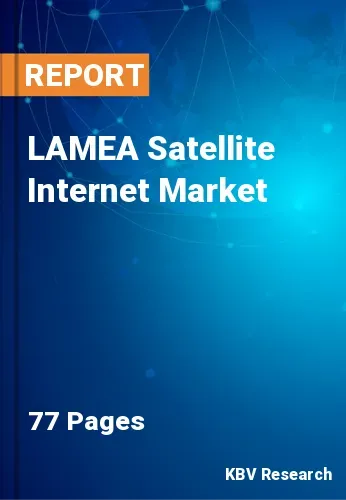The Latin America, Middle East and Africa Satellite Internet Market would witness market growth of 25.4% CAGR during the forecast period (2022-2028).
The same category also includes over 5 billion individuals who live less than 10 kilometers from fiber optic cable infrastructure, while 3.6 billion people live more than 25 kilometers away. The lack of digital literacy, the cost, and the lack of vernacular material affect about 2.4 billion individuals who reside in 4G coverage areas but do not currently use internet services.
Satellite internet service distribution is made possible by these data service vents. Internet adoption has grown dramatically over time, and a few inventions have been able to close some of the proliferation gaps. One of the technologies that have helped achieve high-growth development is satellite broadband.
Another method of accessing the internet is through satellite internet technology, which uses satellites to wirelessly broadcast broadband from orbit, much to how satellite TV is currently delivered. Due to cost restrictions, this technology is only employed in economically viable locations as opposed to unfavorable geographic regions with low populations and sites with a significant distance between high-capacity networks and the last networks.
In collaboration with regional and global stakeholders, TDRA facilitates satellite communications. The UAE currently runs nine satellites via three operators (Al Yah Satellite Communications Company, Thuraya Satellite Communication Company, and Mohammed Bin Rashid Space Centre - MBRSC). More than 140 nations are served by the UAE satellites in two primary orbits: geostationary and low earth orbit. These satellites offer remote sensing, mobile satellite service, broadcast satellite service, and fixed satellite service.
The Brazil market dominated the LAMEA Satellite Internet Market by Country in 2021, and would continue to be a dominant market till 2028; thereby, achieving a market value of $139.1 million by 2028. The Argentina market is experiencing a CAGR of 26% during (2022 - 2028). Additionally, The UAE market would display a CAGR of 25% during (2022 - 2028).
Based on Frequency Band, the market is segmented into K-band, X-band, C-band, and L-band. Based on Industry, the market is segmented into Government & Public Sector, Military, Media & Broadcasting, Maritime, Energy & Utility, Transport & Cargo, Corporates/Enterprises, and Others. Based on countries, the market is segmented into Brazil, Argentina, UAE, Saudi Arabia, South Africa, Nigeria, and Rest of LAMEA.
Free Valuable Insights: The Global Satellite Internet Market is Predict to reach $10.5 Billion by 2028, at a CAGR of 21.9%
The market research report covers the analysis of key stake holders of the market. Key companies profiled in the report include Singapore Telecommunications Limited (Temasek Holdings (Private) Limited), Hughes Network Systems, LLC (EchoStar Corporation), Viasat, Inc., OneWeb (Network Access Associates Ltd.), Bentley Walker Ltd. (Freedomsat), Thuraya Telecommunications Company PJSC (Al Yah Satellite Communications Company PJSC) (Mamoura Diversified Global Holding PJSC), Eutelsat S.A., Space Exploration Technologies Corp., AXESS Network Solutions S.L., and DSL Telecom.
By Frequency Band
By Industry
By Country

Our team of dedicated experts can provide you with attractive expansion opportunities for your business.

